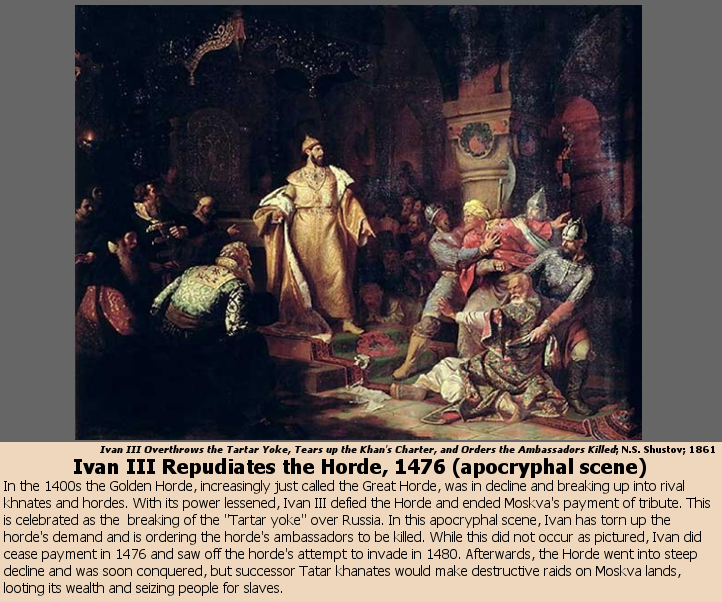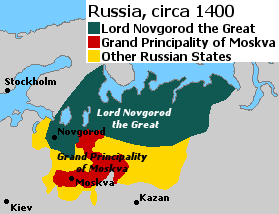

Ivan III Repudiates the Horde, 1476 (apocryphal scene)
In the 1400s the Golden Horde, increasingly just called the Great Horde, was in decline and breaking up into rival khanates and hordes. With its power lessened, Ivan III defied the Horde and ended Moskva's payment of tribute. This is celebrated as breaking the "Tartar yoke" over Russia. In this apocryphal scene, Ivan has torn up the horde's demand and is ordering the horde's ambassadors to be killed. While this did not occur as pictured, Ivan did cease payment in 1476 and saw off the horde's attempt to invade in 1480. Afterwards, the Horde went into steep decline and was soon conquered, but successor Tatar khanates would make destructive raids on Moskva lands, looting its wealth and seizing people for slaves.
Comments
How Bad was the Tatar Yoke?
The Mongol Invasion of the Rus lands was an immense catastrophe, with countless violent deaths, massive destruction including burning of cities, and widespread looting and enslavement. It resulted in the "Tatar Yoke", with the Mongol/Tatar overlords of Rus/Russia demanding tribute and slaves, punishing anyone who resisted. However, some argue that things in Rus/Russia were not all that different under the Tatar Yoke than in previous times. Before the Mongols, Kievan Rus had broken up into competing states under princes who frequently raided or went to war with one another, taking loot and slaves. They often vied to be the Grand Prince and thus in theory be superior to the other princes, although in practice the more powerful princes would ignore or even overthrow the Grand Prince when they could. The wars between the princes were destructive, with, for example, Kiev being burnt several times.
During the Tatar Yoke, the Russian princes still competed with one another, including raiding and going to war, taking loot, territory, and slaves. The Grand Prince was now chosen by the khan of Golden Horde and collected Rus tribute for the horde, so the princes now vied and conspired to win the khan's favor and be appointed Grand Prince. Rus princes occasionally defied the Horde or revolted, but overall the princes accepted the authority of the khan to appoint the Grand Prince until the horde was in deep decline.
Why does this matter? The Tatar Yoke is sometimes portrayed as a heavy burden on Rus/Russia, but it may have been little or no more onerous than the burden of the Rus civil wars. Also, some sometimes invoke the image of a patriotic struggle to free Russia from the yoke, but as noted most princes most of the time actively participated in the Golden Horde's system. These portrayals are part of a larger effort to justify Tsarist absolutism and Russian imperialism: the Russians need a strong leader to defend Russia from subjugation by foreign enemies, and the best defense is offense: conquer them before they conquer you. While Russia certainly needed to be strong to defend itself against invaders, such as the Mongols/Tatars, Teutonic Knights, and others, this still does not justify absolute rule or imperialism. Another way to see it is that the Russian rulers wanted absolutism and conquest, and they used the need of Russia to be strong to justify their own ambitions.

You may think that absolutism was inevitable for Russia, but it was not. Novgorod provides a counter-example. "Lord Novgorod the Great", sometimes called the Novgorod Republic, was a Rus/Russian state in the northern part of Rus/Russia. Novgorod itself was a major Rus/Russian city and was ruled by princes. Over time, however, the Novogorodian government evolved along democratic lines. The people gained the power to choose their prince, and they could discharge him if they became unhappy with him. They could convene a Veche, an assembly of the people, to elect city officials and to vote on how to handle issues facing the city. This system was more like a constitutional monarchy than a democracy, and the nobles of Novgorod also held a lot of power and influence. The Orthodox Church, too, had great influence, as the Archbishop of Novgorod was always an important city official. However, the people of Novgorod also had the right to elect their archbishop, unlike the usual practice elsewhere, in which archbishops were appointed by top church officials. Novgorod was a prosperous city with many trading links to other lands. For a long time, it was also the biggest Russian state, larger than the Grand Principality of Moskva, although Moskva was more populous. While Moskva would come to dominate Novgorod and later almost destroy it, the example of Novgorod shows that Russian absolutism was not inevitable.